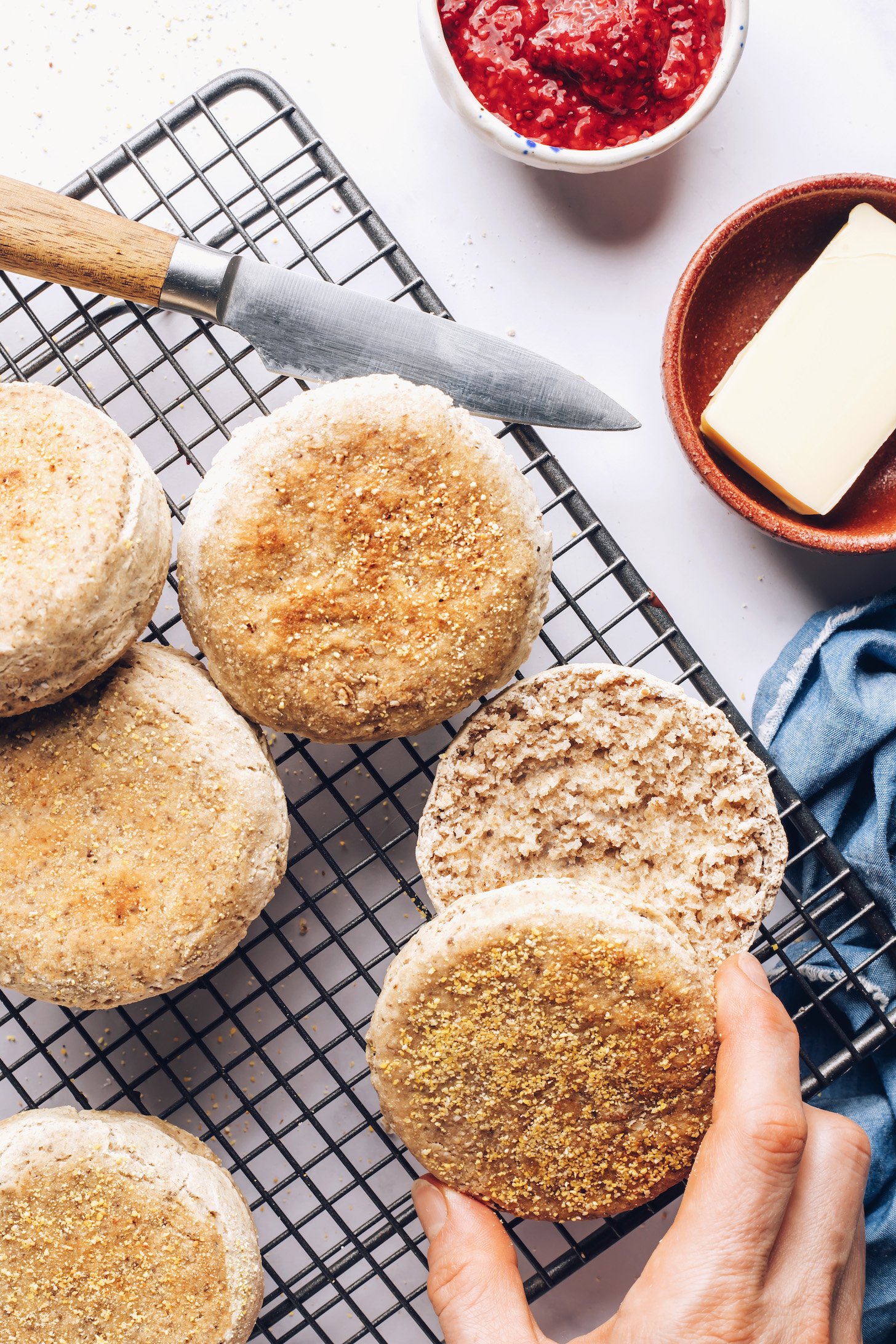
Any English muffin lovers out there? They’re one of our old favorites and we’ve finally made a gluten-free version that’s just as good as the real deal! These delicious gems are perfectly tender, toasty, SO versatile, and also happen to be vegan!
They’re soft yet crusty and require just 10 ingredients! We love them with butter and jam, or to make Eggs Benedict (find our plant-based version here!) for a simple yet elegant brunch (Mother’s Day, anyone?). Let us show you how it’s done!
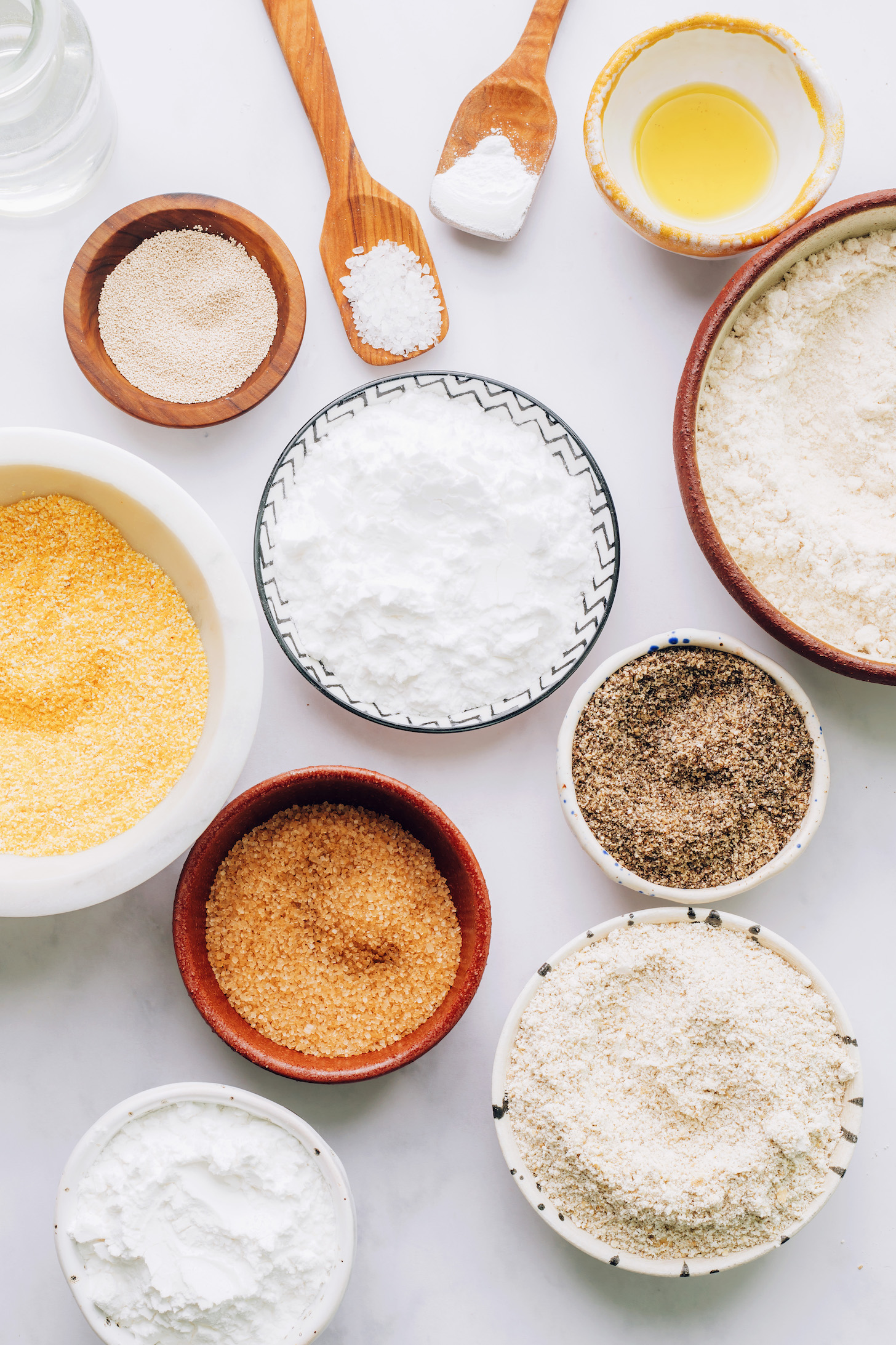
Origin of English Muffins
An English muffin is a small, round, yeasted bread that’s typically sliced in half horizontally and toasted. The earliest recipe resembling these toasty delights is believed to have been in a 1758 British cookbook. At the time, they were just called “muffins” and were sold door to door in England.
Then when Samuel Bath Thomas moved from England to New York City, he opened a bakery and began making his mother’s muffin recipe. In 1894, he filed a trademark, claiming to be the first to use the term “English muffin.” English muffins are now a breakfast favorite in many places around the world including North America, Australia, and New Zealand. In Germany, they’re known as Toastbrötchen, and a similar dish called bolo de caco is served in Portugal.
The following is our gluten-free and plant-based take on the delicious creation!
How to Make Gluten-Free Vegan English Muffins
For classic English muffin flavor (and texture), we start with the yeast, activating it by mixing dry active yeast with warm water and a little bit of sugar (because yeast loves sugar — and who can blame it?).
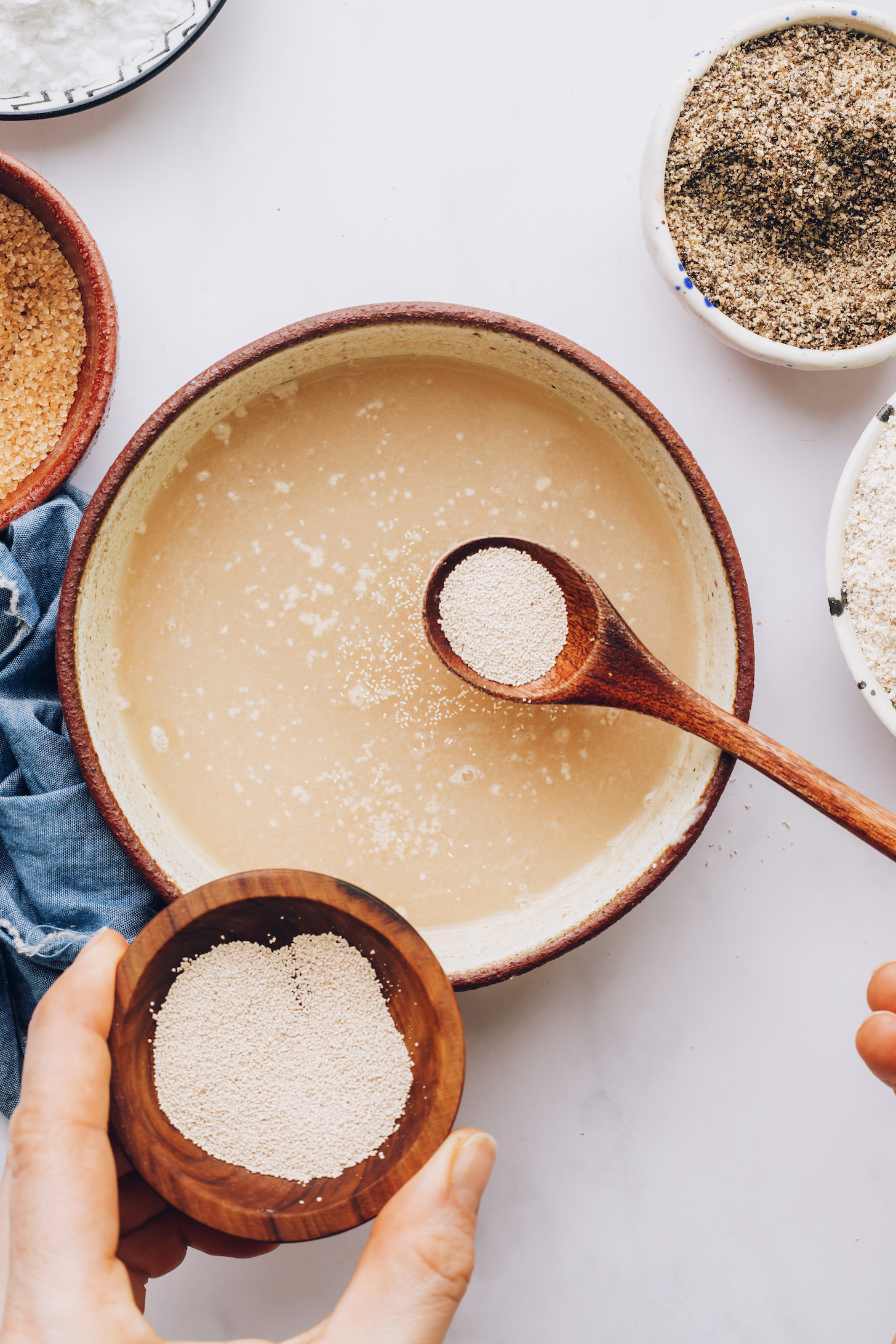
Once the yeast has activated, we stir in ground chia seeds as the egg-free binder.
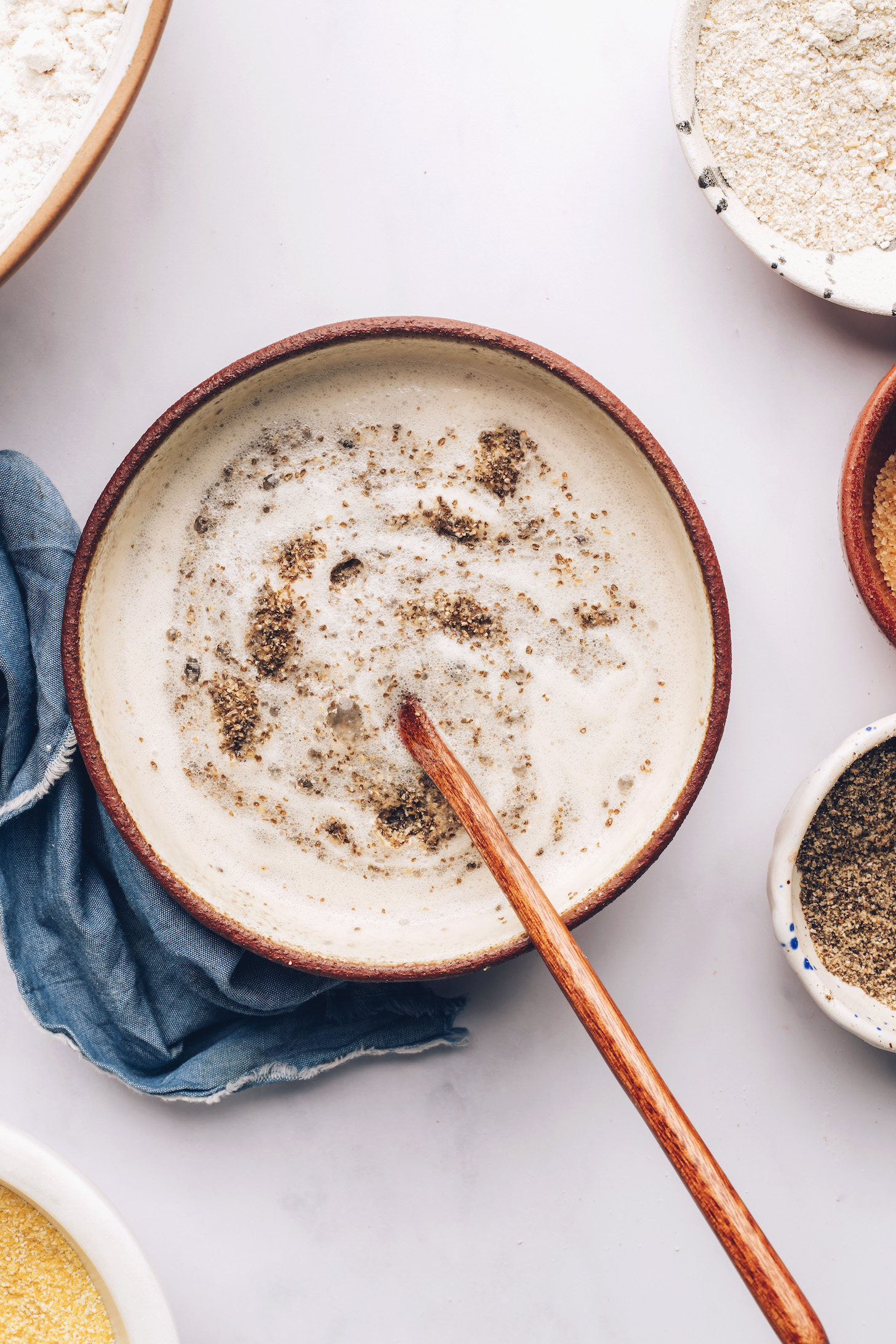
Then we transition to the dry ingredients. A combination of gluten-free flours provides the perfect balance of structure (brown rice flour + oat flour), fluffiness (potato starch), and stretch (tapioca starch). The last dry ingredient is sea salt for flavor.
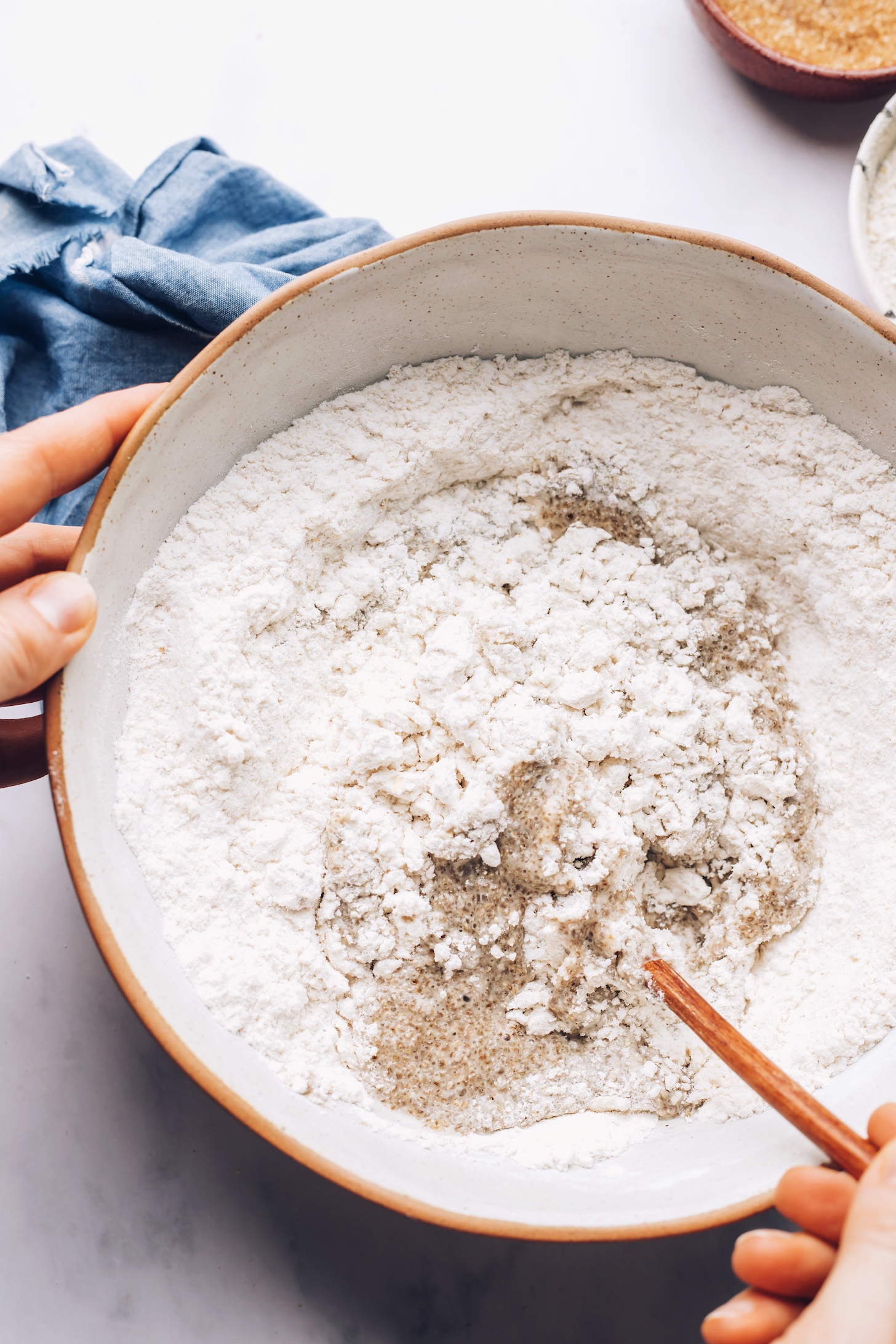
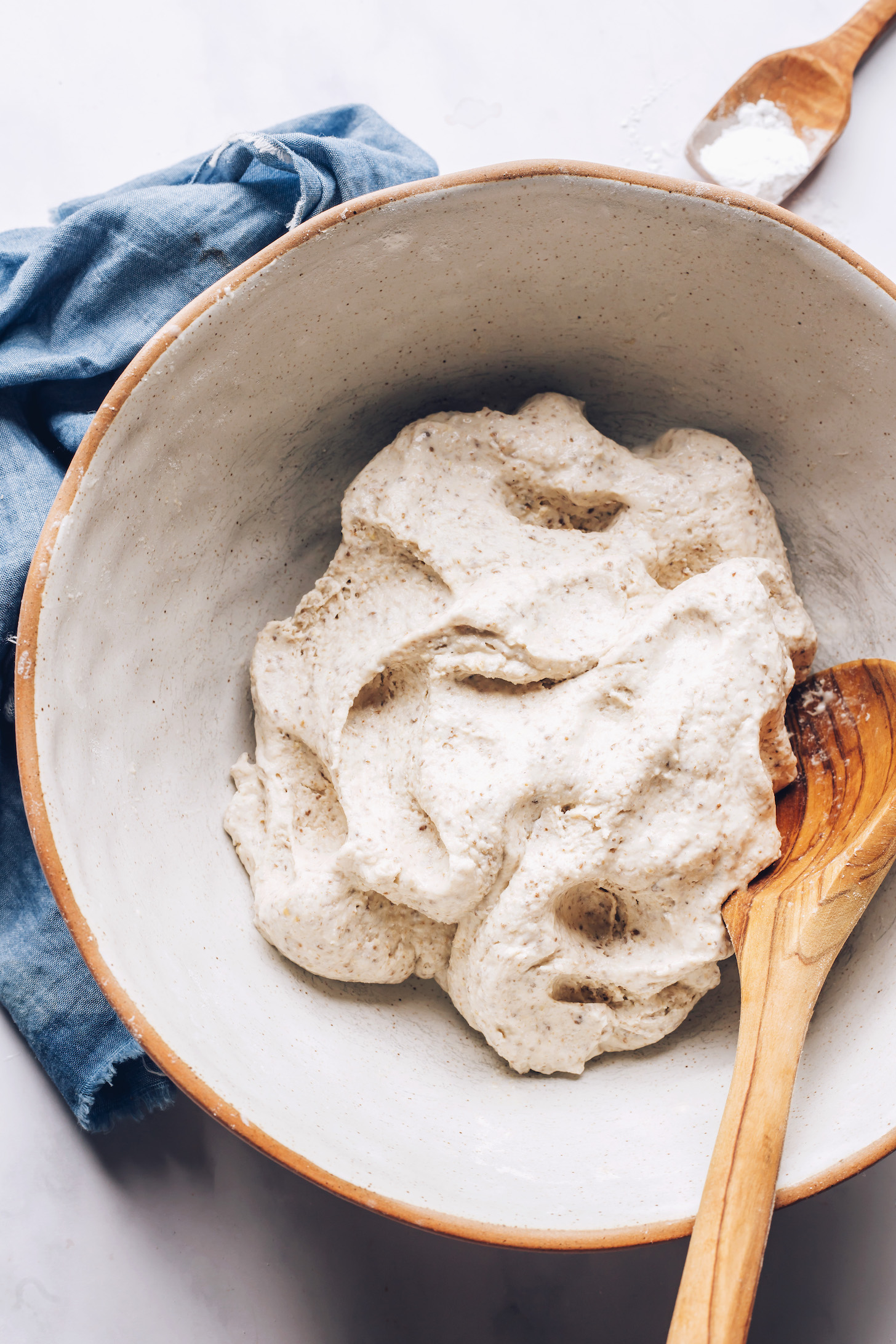
After stirring the wet ingredients into the dry, we cover with a kitchen towel and let the dough rise. Then for extra lift, we stir in some baking powder dissolved in warm water and let the dough rise once more. We know, Sally, it’s a little extra effort, but you get amazing English muffins out of the deal! Plus, you can get some chores done in the meantime. We knew you were still in!
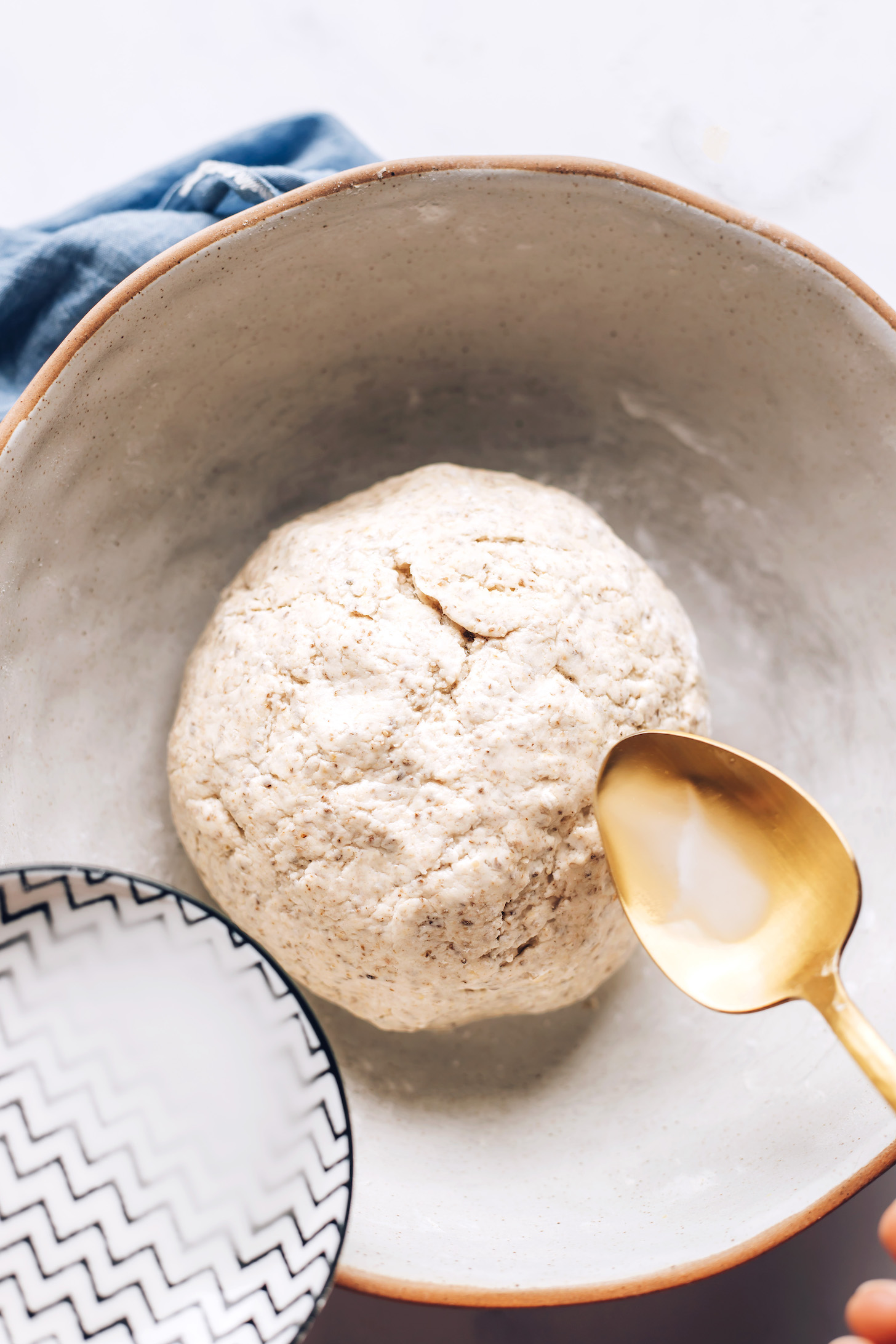
Once the dough is done rising, you can either cook your English muffins right away or you can refrigerate the dough overnight if you want fresh-in-the-AM muffins!
When ready to cook, divide and shape the dough, then place on a baking sheet lined with cornmeal (to prevent sticking).
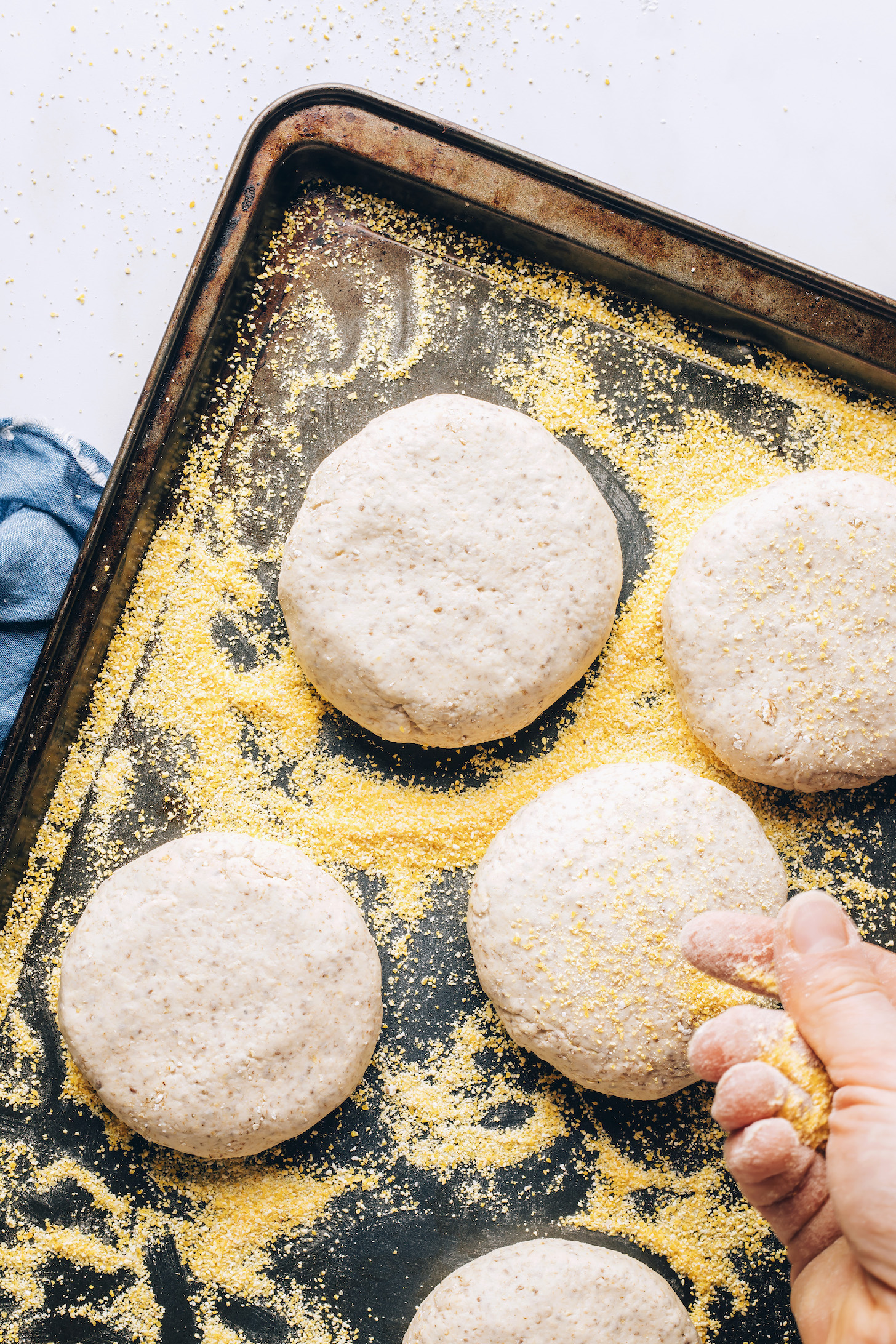
Then cook in an oiled skillet, flipping to get both sides of the English muffins nicely browned, repeating until you’ve cooked them all! The last step is to bake in the oven to ensure cooked centers.
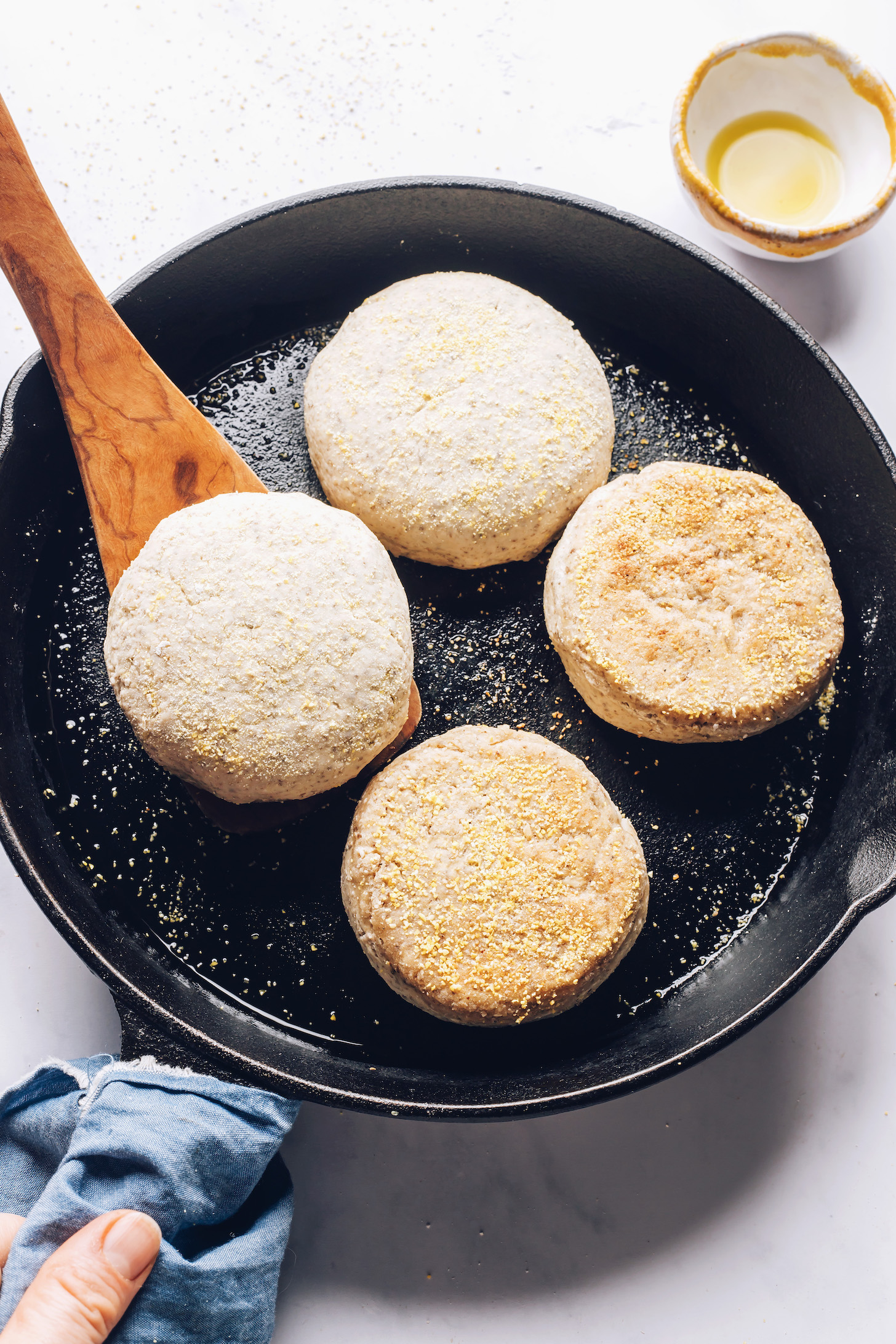
We hope you LOVE these English muffins! They’re:
Tender
Toasty
Wholesome
Comforting
Versatile
& Just like the real deal!
They’re delicious toasted with butter and jam or made into breakfast sandwiches or Eggs Benedict (find our plant-based version here!).
More Delicious Breakfast Recipes
- Fluffy Millet Breakfast Cake with Stone Fruit
- Carrot Cake Baked Oatmeal
- Easy Baked Beans on Toast (British-Inspired)
- Spring Frittata with Leeks, Asparagus, and Sweet Potato
If you try this recipe, let us know! Leave a comment, rate it, and don’t forget to tag a photo @minimalistbaker on Instagram. Cheers, friends!
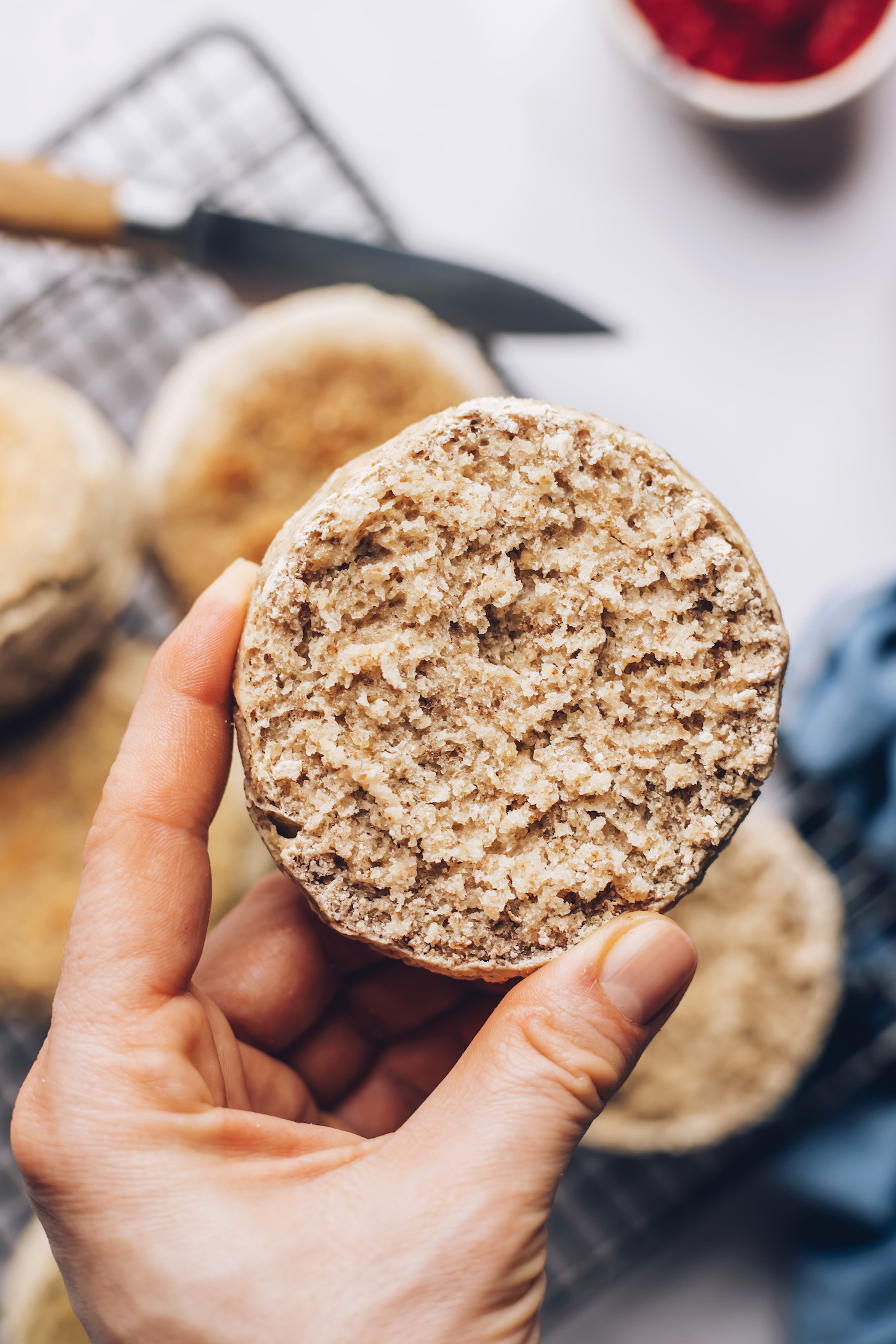
Gluten-Free English Muffins
Ingredients
- 1 cup warm water (DIVIDED)
- 1 Tbsp cane sugar (ensure organic for vegan-friendly)
- 1 ½ tsp active dry yeast
- 1 Tbsp ground chia seeds
- 3/4 cup brown rice flour
- 1/2 cup tapioca starch (also called tapioca flour)
- 1/3 cup potato starch (NOT potato flour)
- 2/3 cup oat flour* (DIVIDED // certified gluten-free as needed)
- 1 tsp sea salt
- 1/4 tsp baking powder
- 2 Tbsp cornmeal (DIVIDED // optional)
- 2 tsp avocado oil (for greasing pan)
Instructions
- In a medium mixing bowl, whisk together 3/4 cup (180 ml) of the warm water (100-110 degrees F / 38-43 C) and sugar until the sugar is dissolved. Whisk in the yeast and let it bloom on the counter for 10 minutes until frothy. If it doesn’t foam, start over — your water may have been too hot or the packet of yeast was expired.
- Once the yeast has bloomed, whisk in ground chia seeds and let the mixture gel for about 5 minutes. Meanwhile, in a large bowl, whisk together the brown rice flour, tapioca flour, potato starch, 1/3 cup (30 g) of the oat flour, and salt.
- Add the wet ingredients to the center of the dry and stir together with a wooden spoon — it should turn into a thick and dense bread dough. You can knead with your hands for a few minutes to thoroughly combine. Cover the dough with a clean kitchen towel and let rise for one hour in a warm spot.
- Once the dough has risen, measure out the remaining 1/4 cup (60 ml) of warm water (100-110 degrees F / 38-43 C) and add the baking powder to the warm water to dissolve. Add the water mixture to the dough and mix with a wooden spoon or hand mixer until all lumps are broken up. It should be thick and sticky. Let this mixture rest again for 30 minutes in a warm spot covered with a kitchen towel.
- While the dough rests, prepare a baking sheet by sprinkling 1 Tbsp (19 g) of cornmeal evenly across it, and preheat the oven to 350 F (176 C). Once rested, add the remaining 1/3 cup (30 g) of oat flour to the dough and stir with a wooden spoon. It should be thick and semi-sticky, but not so wet that it sticks badly to your hands. If it is too sticky, add oat flour 1 tsp at a time until you can handle the dough. At this time, you can choose to make your English muffins right away, or transfer the dough to the refrigerator for up to 12 hours.
- To make the muffins, divide the dough into 6 even pieces and shape them into flat, round English muffin shapes, about 3 inches wide and 1/2-inch thick. Place the prepared dough onto the baking sheet on top of the cornmeal. When all the dough is shaped into English muffins, sprinkle the remaining 1 Tbsp cornmeal over top of them, aiming for even distribution.
- Add 1 tsp avocado oil to a cast iron skillet, griddle, or non-stick pan and turn on medium-high heat. Once the oil is shimmering, turn it down to medium heat and add as many English muffins as you can. It is helpful to use a metal spatula to quickly pick up the English muffin dough from the baking sheet and flip it into the skillet. Cook for 4-5 minutes on the first side, being careful not to burn. Flip and cook for 3-4 minutes on the second side, then remove from the skillet and place back on the baking sheet. Repeat until all muffins have been cooked in the skillet. Place the baking sheet of cooked muffins in the oven and bake for 10-15 minutes, or until the outside is very firm and crusty and they sound somewhat hollow when tapped.
- Remove the English muffins from the oven and let cool for 10-15 minutes. Instead of cutting the muffins, use a fork to poke into the side of each English muffin all the way around until it can be easily pulled apart. Serve immediately with jam and butter of choice, or toast for extra crispy goodness! Leftovers keep well in an airtight container for 2 days at room temperature and reheat best in a toaster.
Video
Notes
*Nutrition information is a rough estimate calculated without optional ingredients.
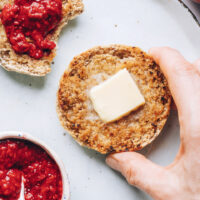
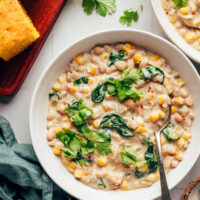

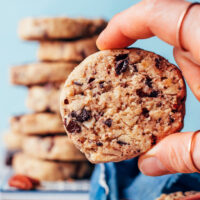


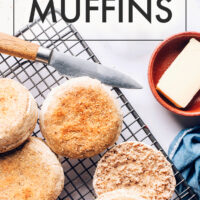
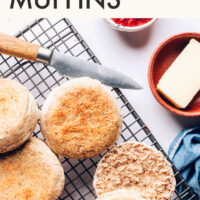
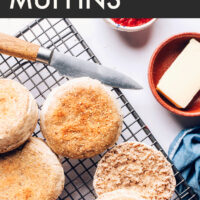
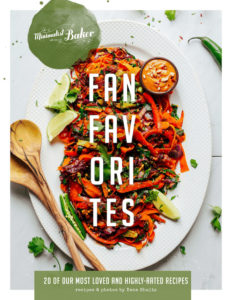
Jay Fischer says
I made this recipe today with some alterations and it came out great both in both looks and flavor. Since we’re gluten-free I used Bob’s Red Mill gluten-free flour which is mostly brown rice flour anyway. Instead of tapioca starch I used arrowroot and I used coconut sugar instead of cane. I didn’t have any oatmeal flour so I just threw some of my oatmeal in the blender and made my own.
Great! Thank you for sharing, Jay!
kinga says
hi,
I don;t have tapioca flour, can you recommend a substitute? :)
thx,
Kinga
Hi Kinga, arrowroot starch would be the next best option, but we haven’t tested it in this recipe. Let us know if you try it!
Jay says
I used arrowroot instead of tapioca and it came out great.
Ann Miller says
I had really good luck with this recipe!! Can’t wait to try them….they look amazing!
We hope you enjoy, Ann! Let us know how they taste!
Chris T says
What would be a good substitute for potato starch? Thank you!
Hi Chris! We haven’t tried these without potato starch and cannot guarantee results. We think corn starch or more oat flour might work, but we aren’t sure. Let us know how it goes if you give it a try!
Elisa says
Oh my gosh these were AMAZING. I realized I had tossed my old chia so I used a little psyllium husk (made the gel first, then added the yeast and sugar with a touch of apple cider vinegar since it helps yeast rise better) and didn’t have tapioca or potato starch so I used corn and arrowroot. I also only had white rice flour (oops). The recipe needed a little extra water in the end (probably because of all the subs) but it worked perfectly. The last sub I made was purely for taste, since I find sorghum to be more neutral than oat (I subbed the second 1/3 c oat flour for 1/3 c sorghum). The texture is out of this world. So light and fluffy, yeasty smelling, and SO CLOSE to “real” gluten-y products. My gluten eating parents even thought they were delicious!
Amazing! We’re so glad they turned out well, Elisa. Thank you for the lovely review and for sharing your modifications! xo
Kim Acuff says
Just made these English Muffins this morning and they are the best I have had since going gf 15 years ago. The only change I made was using an actual egg instead of replacement. This resulted in needing a bit more oat flour but they turned out 10/10. The flavor is excellent and the crumb is spot on. This now goes into my regular baking rotation.
Other than using an egg- I followed directions as written. Great recipe.
Aw, YAY! We’re so happy you enjoyed the result, Kim. Thank you for the lovely review! xo
Jenn says
I tried these English muffins and they were a hit in my family. I was so happy to find a gluten free recipe that didn’t call for a gluten free flour mix or any type of gum.
I also substituted an egg for the chia seeds and put it right in the water measuring cup so as not to distort the liquid amount. I also used sunflower oil instead of the avocado oil. I also made a double batch, so I know that can alter things a bit too.
I think I may have under-baked them a little and that made them heavier and darker in the middle. Do you have an internal temperature to cook them to?
Thanks so much for sharing this recipe and your hard work with us.
Hi Jenn, thank you so much for your kind words! We don’t have a recommended internal temperature, but we think adding a little more of the flours should help with the texture for next time. Let us know how it goes!
Jessica says
I haven’t had English muffins in years. I’m beyond stoked that minimalist baker has this recipe. These are hands down 100% better than store bought. My family loves them too.
Yay! We’re so happy to hear that you enjoyed this recipe, Jessica. Thanks so much for the wonderful review!
Ens says
I made this recipe once before, substituting an egg for flax seed. It came out perfectly. This time around I only had white rice flour. I decided to make a half batch and replace 30% of the rice flour with pea protein powder in hopes of adding protein for structure. I also added an extra tablespoon of powdered psyllium husk with the flax seed to raise the fiber content I was lacking in the white rice flour. Happy to say it came out fantastic. It was a tad stickier in texture but I think I was heavy handed on the water.
I may try again with brown rice flour and pea protein powder to see if the added protein aids in the shape and rise.
Thanks for the fantastic recipe as always
Amazing! Thanks so much for the lovely review and for sharing your modifications!
Jen says
Will this recipe work with the Minimalist Baker GF flour blend? Mine just arrived today & I’d love to try the recipe using it. Thanks!
Hi Jen, we’re so excited you bought the blend! We haven’t tried it but unfortunately we don’t think the blend would work in this recipe, if you decide to try it we’d suggest using it in place of the brown rice, tapioca, and potato, and keeping the oat flour the same. You can also check out this page to see which recipes we have tested/developed with the new blend!
Jen says
Thanks so much for the reply & suggestions!!
Jamison says
Love MB recipes so much!
For those asking about yeast free I did actually attempt these subbing the yeast 1:1 with a 50/50 mix of baking soda and lemon juice. I added all flours and baking powder ingredients and then in a separate bowl the 1 cup water and dissolved coconut sugar then added the written amount of ground chia plus a little extra ground flax. I mixed all those together and then added the baking soda/lemon juice combo at the very end, divided into 6 portions on a sheet pan and baked at 365 for 15 minutes. They are probably slightly more dense then the original recipe but they still rose and turned out great! Next time I will attempt to put them on the heated skillet before baking but overall turned out very good.
Thanks so much for sharing, Jamison. So glad you enjoyed!
pvp says
Can I use monk fruit sweetener in place of the cane sugar? I’d like to stay oil free…have an alternative for the avocado oil? Thank you. Looking forward to making these.
Hi, the sugar is important for activating the yeast, but you could use maple syrup if you’d be okay with a natural sweetener. We think they would stick to the pan without the avocado oil, but you could test one using a well-seasoned cast iron or non-stick pan and see how it goes.
SD says
How would I use your DIY GF Flour blend in this recipe?
Hi, we don’t think the DIY blend would work in this one. You really need the specific flours to get the right texture. Hope this helps!
Vegan_hen says
I was skeptical about this recipe, but I have to say even though it took me quite some time to make this the first time, it is well worth the time. They came out as good as any gluten-free vegan English muffins that I have purchased, may be even better. I will definitely make these over and over again and only by the store but if absolutely necessary. Highly recommend this recipe.
Aw, thank you SO much for the lovely review! We’re so glad you enjoyed them! xo
Jan says
Oh my! These are worth the time. Made them last night and they turned out super delicious. These muffins were fun to make and even more fun to eat with butter and honey-yummy! Thanks for this wonderful gluten free muffin, MB!❤️
Whoop! We’re so glad you’re enjoying them, Jan. Thank you for sharing! xo
Iuliana says
Hello!
What can I use instead of potato starch?
Hi Luliana, potato starch is key for making gluten-free baked goods light and fluffy. The next best alternatives would be corn starch or more oat flour, but we can’t guarantee the texture will be the same.
Mary N says
Oh thank you! One of the first GF successes for me! I totally recommend this recipe to others. The only change I have for next time is to make 8 instead of 6. They are rather large for me.
Woohoo! We’re so glad to hear it, Mary! Thank you for sharing! xo
Claudia says
I made this recipe and my husband liked these muffins more than the store bought muffins that cost $7 for half a dozen! I even rushed in to make it and didnt read the recipe all the way before preparing it , consequently, I didnt follow the steps to the letter. Im going to make it again now properly. Thank you so much.
Yay! So happy to hear you both enjoyed these, Claudia. Thanks for the great review!
Stacy says
These are incredible!!! The dough is so easy to work with and not sticky and it tastes as good as a gluten English muffin. Thank you for an amazing recipe! I’m making a double batch next time :)
Whoop! We’re so glad to hear it, Stacy! Thank you for the lovely review! xo
Lily says
Can I use white rice flour instead of brown?
Hi Lily, brown rice flour is important for structure. The next best option would likely be sorghum flour, or another whole grain flour. Hope that helps!
Josee says
I only had white rice flour on hand so I gave it a try. The result is quite good actually. The challenge is in the texture, as you mentioned. I had to add about 1/4cup more white rice flour for the dough to be firm enough for me to manipulate and shape it. It wasn’t easily workable so I’d add more white rice flour and/or tweak other ingredients to firm up the dough. My muffins were fluffy and had air bubbles. I haven’t yet tried the original version with brown rice flour but it seems denser than what I obtained with white rice flour. With a little more tweaking I think white rice flour can be substituted successfully. Thanks for, at last, a yummy GF English muffins recipe!
Thanks for sharing your experience, Josee!
Katy says
These were AWESOME! I did use a real egg instead of the chia (I’m only GF/DF, not vegan, so egg is OK) – I decreased the water to 3/4 cup total to compensate, since 1 egg typically measures ~1/4 cup liquid. I had to add a bit extra oat flour at the end but they worked beautifully and taste amazing!! Thank you, these are going on permanent rotation!
Amazing! We’re so glad you enjoyed them, Katy. Thank you for sharing! xo
Alexa says
“Leave to cool for 10-15 mins?” Well, that was NEVER going to happen, given the warm yeasted scent of these muffins! I followed the recipe exactly as written and the muffins were perfect – soft and light inside, gently crusty outside. My wheat-eating partner couldn’t tell the difference between these wonderful G-F muffins and traditional wheat-based ones, and neither could I, from memory. Not a hint of the usual grittiness that G_F breads often have. Next time I might try just baking the dough in a loaf tin, in case it makes an excellent bread too. Thank-you so very much for this perfect recipe :).
Yay! We love to hear this. Thanks so much for the great review, Alexa!
Jay says
did you ever try baking the dough in a bread pan? If so, how was it?
Laurie says
I made these yesterday, we ate them today. I think I added too much flour because although the taste was really good, they were a bit dense. Looking at your photo I see more crumbs than mine had. I’m going to try again next weekend! Thanks for a great recipe!
Thanks for sharing your experience, Laurie! These are definitely more dense than traditional english muffins, but not unpleasantly so. Let us know how it goes if you give them another try!
Cat says
MB you have done it again! These are amazing. I did a double-batch on faith that none of your recipes have ever turned out badly, and I am SO glad I did a double-batch. Thank you for creating this recipe – I have been GF for 15 years and this the first time I’ve ever eaten a GF English muffin that was reminiscent of a gluten-filled one! I did need to add a bit more oat flour than called for in the last step. This is going to be a new favourite. Thank you, thank you, thank you!
Amazing! We love to hear this. Thanks so much for the wonderful review, Cat, we’re so glad you enjoyed these!
Erin R. says
Hi! Can I substitute with coconut sugar if that’s what I have on hand? Thank you!
Hi Erin, we haven’t tested it with coconut sugar, but it might work! Let us know if you try it!
MEB says
I can’t do even GF oats and am intolerant to sorghum. What would be the next best option (understanding that it isn’t tested and can’t be guaranteed)? Would buckwheat work?
Hi there! We haven’t tried this with buckwheat, but it could possibly work. Let us know how it goes if you give it a try!
MEB says
Just made these tonight. They are delicious! I can’t eat oats or sorghum or corn so a few changes.
Subs:
🔸Riceberry flour instead of brown rice (what I had on hand) which is why they are so dark
🔸 buckwheat flour instead of oats or suggested alternative sorghum; I had to add an extra 3-4 tbsp to the 30g after the baking powder and resting to be able to handle the dough
🔸 home ground buckwheat groats instead of cornmeal
🔸I also use home made baking powder (baking soda + cream of Tartar) because of the corn in baking powder
Mine were slightly gummy still but I baked for 10 minutes. Next time, I’ll go slightly longer.
We’re so glad they turned out well! Thank you for the lovely review and for sharing your modifications! xo
MEB says
Just popping back in to say that these also work with Teff flour as the oat flour substitute. I haven’t been able to source celiac safe buckwheat flour recently so had to switch. I make these at least twice a week.
With the Teff, I end up having to add an extra 30g at the end (90 g total) to get the right consistency.
Tips for others:
1. leaving it to rise longer on the first rise and doing at least an hour or so in the fridge after adding the last flour leads to a lighter crumb.
2. Instead of putting the oil in the pan, I oil my hands when forming the muffins. This way I don’t end up with burnt buckwheat meal in the pan.
Amazing! Thank you for sharing your experience and modifications! xo
L Dee says
I love to top them with scrambled eggs.
The Vegan Goddess says
I would to leave out the yeast. Perhaps I could make up for it by adding more baking powder.
What do you think?
Hi, we think the yeast is pretty crucial in this recipe for the right “bready” taste and texture. Let us know if you do some experimenting!
The Vegan Goddess says
I might try this tip from The Spruce Eats and see how it comes out and will let you know if it works:
Baking Soda and Lemon Juice
When you combine yeast, flour, and water, sugars are released and consumed by the yeast, which in turn releases carbon dioxide.1 It’s this carbon dioxide that’s responsible for making bread rise.2 You can create a similar carbon dioxide release by combining baking soda with an acid.3 Some recipes, like biscuits, already rely on this.4
If you want to successfully substitute the yeast called for in a recipe, you just need to swap in the right amount of baking soda and acid to make the dough rise. You can use lemon juice, buttermilk, or milk combined with an equal part of vinegar as your acid.
Add all the ingredients according to the recipe.
Then, add equal parts baking soda and lemon juice to equal the amount of yeast called for in the recipe. For example, if the recipe calls for one teaspoon of yeast, you need to add a half teaspoon of baking soda and a half teaspoon of lemon juice. Buttermilk or a 50-50 mix of milk and vinegar can also be used in place of the lemon juice.
Bake as usual. The dough doesn’t need the typical rise (or proofing) time when you’re using this substitute. In fact, for the reaction to work properly, it’s important to get your dough in the oven as soon after you’ve added these final ingredients as you can.
Tip
For the best results, use fresh baking soda. Open containers are only good for six months.
Rachel says
Just made this recipe yesterday! I didn’t have any tapioca flour on hand so I used arrowroot. Because of this sub, I had to add a bit more water for my dough to initially come together. These babies turned out so delicious!! Perfect to pair with my homemade jam. They are soft on the inside and a perfect golden brown on the outside.
We’re so glad you made the recipe and enjoyed it, Rachel! Thank you for sharing your experience! xo
Judy says
Hello minimalist team, I’d love to make this, your recipes are “theBomb” I’ve had great success with so very many of them, but first, I have 2 questions.
1. Instead of the expense of procuring all those individual flours, can I use 1/3 Bob’s Red Mill 1-1 gluten free + 1/3 oat flour? Or some ratio thereof ?
2. Can I replace the cornmeal with millet flour in this recipe. It has a similar texture. sorry, but I don’t do corn (meal) it’s all GMO and I don’t trust when they say organic isn’t GMO, too. Icy conflicting evidence, and there’s no guarantee with cross pollination. I’ve use millet flour when making pizza crust, and on the pan for a crispy crust.
Thanks for the assistance. Keep up the great work of helping all of us happy home cooks to continue baking minimalistic way.
Hi Judy, we’re so glad you’ve had success with so many of our recipes! We think they will turn out more dense vs. light and fluffy if subbing Bob’s Red Mill 1:1 and oat flour because it will have a lesser amount of the starchy flours. But if you want to try it, we’d suggest 1/3 cup oat flour and ~2 cups GF flour blend, adding more as needed for the texture in the photos. Millet flour would be fine in place of cornmeal, or you can just leave it out!
Kirilly says
These look delicious! Do you think a flax egg would work in place of the chia egg? Thank you!
Hi Kirilly, we find ground chia is a little better at binding, but flax might be okay. We’d suggest using 2 Tbsp flaxseed meal. Let us know how it goes!
Mandy says
Hi @Kirilly: I was out of chia seeds and I had your idea of grinding up some flax seeds instead — I used the same ratio. Turned out delicious and the texture was spot-on. Plus the flax lends some pretty flecks in the dough. I’ve made two batches of these so far and I can’t keep them in our house longer than a few days! :)
Thank you for sharing, Mandy!
Thomas Karlmann says
What would you suggest as substitute for the “Potato Flour/starch”?
I don’t eat potatoes.
Hi Thomas, potato starch is key for making gluten-free baked goods light and fluffy. The next best alternatives would be corn starch or more oat flour, but we can’t guarantee the texture will be the same.
Victoria Evanko says
Hi there, what temp are these to be baked at in the oven? I think the temp may be missing in the recip. Thank you!
Hi Victoria, 350 F (176 C). See step 5. Hope you love them!
Sheila says
Can you use quinoa flour instead of rice flour?
Hi Sheila, we find quinoa flour has a stronger flavor, but it might work okay structurally. Let us know if you try it!
Oakhurst Park says
I woke up this morning craving English muffins. Having bought some disgusting GF vegan ones a few years ago I assumed I was hosed. Then I got this magical recipe in my inbox. HOW DID YOU KNOW?!?!
Made them and ate them. I didn’t have any oat flour ready so I used sorghum flour instead. They turned out AMAZING! Perfect. Delicious. The only thing I’ll change next time I make them (I will be making these on the reg BTW) is that I would make 8 muffins instead of 6. They were a bit on the big side for me.
Thank you Minimalist Baker!!! <3
Please put out another cookbook :-)
Aw, we’re SO glad you enjoyed this recipe! Thank you for your kind words and lovely review! xoxo
Jan Ohlson says
Great, so nice to find enjoyable GF food to eat. Many 🙏🏻
Colleen says
Hello,
this English Muffin recipe looks great but I cannot tolerate
even certified GF oats. Do you have any ideas for a subsitute?
Maybe amaranth flour? Quinoa Flour?
Thanks,
Colleen
Hi Colleen, we find sorghum flour usually subs well 1:1 for oat flour. We haven’t tested it in this recipe, but let us know if you do!
Diane says
Is there an option to bake these in an oven? I really need to avoid oils and fried foods. Thank you.
Hi Diane! The nature of english muffins is that they are pan-cooked, so you could possibly start them in a nonstick skillet with no oil, but we haven’t tried it. We also have not tried baking them without pan-cooking, so we don’t know if it will work, but you could try it for 20-30 minutes. Hope this helps!
Jan says
Hi. I can’t use potato starch. Do you have a suggestion for a substitution?
Thanks
Hi Jan! We haven’t tried these without potato starch and cannot guarantee results. We think corn starch or more oat flour might work, but we aren’t sure. Let us know how it goes if you give it a try!
Tatiana says
Ooh these look delicious! Do you have any recommendations for a gluten-free substitute to cornmeal? Corn is highly inflammatory for me so I try to avoid it as much as possible.
Hi Tatiana! The corn meal is an optional ingredient, as it is primarily included for a classic english muffin look, and doesn’t add much taste. If you are worried about sticking, you could probably use some oat flour? Hope this helps!
Judy says
Hi Tatiana, I have the same inquiries. I’ve used millet flour to dust the pan when making a pizza crust. It creates a friction on the pan and give you that crisp crust.
Danielle says
Can I use arrowroot instead of tapioca? If so what would the ratio be
Hi Danielle! We haven’t tried that so we aren’t sure if it would work, but it could. The same amount should be a good place to start. Let us know how it goes!
Angela Hayes says
I am allergic to potato. What would you recommend for a substitution?
Hi Angela! We haven’t tried these without potato starch so we cannot guarantee results, but we think corn starch or more oat flour would be your best bet. Let us know how it goes if you give it a try!
Ashlee says
These look wonderful! Question: is there any substitute for the chia seeds? (No chia or flax for me.) How about an egg? Thank you for your thoughts!
Hi Ashlee! We haven’t tried this recipe with eggs so we cannot guarantee results. We think an egg might add too much extra liquid, but we aren’t sure. A slightly lesser amount (maybe 1-2 tsp) of psyllium husk might work, but we haven’t tried it. Let us know how it goes if you give any subs a try!
Kenna says
Hi, I’m very excited to make these – have you tested this recipe using eggs instead of chia/egg replacer?
Hi Kenna! We haven’t tried this recipe with eggs so we cannot guarantee results. We think an egg might add too much extra liquid, but we aren’t sure. Let us know how it goes if you give it a try!